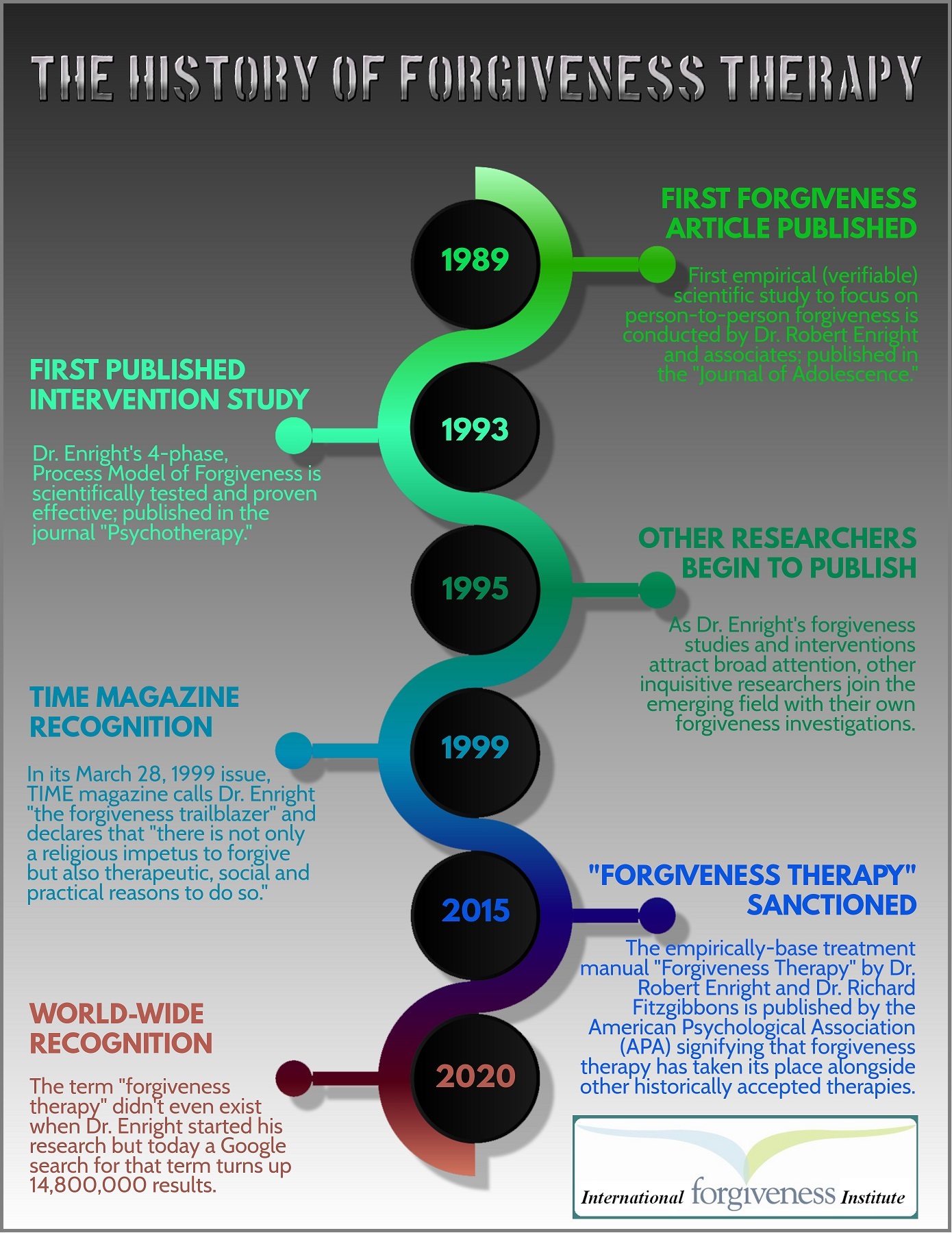Tagged: “forgiveness therapy”
Is wanting to forgive for your own health selfish? Is it effective?
Suppose you hurt your knee while running. Further suppose that you want to make an appointment at Sports Medicine to address the issue. Is this selfish? There is a large difference between being selfish (absorbed with yourself at the expense of others) and engaging in self-care (attending to your needs without neglecting others’ needs). Forgiving is good self-care. Our research shows a cause-and-effect relationship between learning to forgive and improvement in heart health for cardiac patients:
Waltman, M.A., Russell, D.C., Coyle, C.T., Enright, R.D., Holter, A.C., & Swoboda, C. (2009). The effects of a forgiveness intervention on patients with coronary artery disease. Psychology and Health, 24, 11-27.
Our research shows a cause-and-effect relationship between learning to forgive and improvement in fibromyalgia symptoms:
Lee, Y-R & Enright, R.D. (2014) A forgiveness intervention for women with fibromyalgia who were abused in childhood: A pilot study. Spirituality in Clinical Practice, 1, 203-217. doi: 10.1037/scp0000025.
A recent meta-analysis showed a statistically significant correlation between degree of forgiveness and a host of different physical issues:
Lee, Y.R. & Enright, R.D. (2019): A meta-analysis of the association between forgiveness of others and physical health. Psychology & Health, 34, 626-643.
So, yes, forgiving does seem advantageous for one’s physical health.
For additional information, see Forgiveness for Individuals.
Forgiveness: “Groundbreaking Scientific Discovery”
A cutting-edge organization in California that sponsors groundbreaking scientific discoveries has launched a new service called Greater Good in Action and added forgiveness to its list of practices that can help you improve your social or emotional well-being or the well-being of others including your children.
 The Greater Good Science Center (GGSC) at the University of California, Berkeley, not only studies the psychology, sociology, and neuroscience of well-being but also “teaches skills that foster a happier life and a more compassionate society–the science of a meaningful life.”
The Greater Good Science Center (GGSC) at the University of California, Berkeley, not only studies the psychology, sociology, and neuroscience of well-being but also “teaches skills that foster a happier life and a more compassionate society–the science of a meaningful life.”
The Greater Good in Action initiative adds forgiveness to its list of established practices that include compassion, generosity, gratitude, honesty and others. It is a new addition to a service the organization began in July of 2017, called Raising Caring, Courageous Kids that is designed to help parents raise kids of high character who treat others with compassion and respect.
In its inaugural forgiveness practice called Introducing Kids to Forgiveness, Greater Good in Action cites the pioneering forgiveness work of psychologist Robert Enright, Ph.D., and psychiatrist Richard Fitzgibbons, M.D. (co-authors of Forgiveness Therapy, a manual providing instructions for clinicians who want to incorporate forgiveness interventions into their therapy with clients.
Referencing Dr. Enright’s years of hands-on experience teaching children about forgiveness (he has developed 17 Forgiveness Curriculum Guides for kids in pre-school through 12th grade that are being used in more than 30 countries around the world), Greater Good in Action links readers to a separate dissertation on Dr. Enright’s insights into how to help children and adolescents learn and practice forgiveness.
That work concludes that “a wide range of studies have found that forgiveness programs can help kids of different ages feel better, strengthen their relationships, and improve their academic performance.”
Because conflict is inevitable, teaching children about forgiveness early on
may indeed be a path toward building communities
of people who prize and cultivate peace.
Maryam Abdullah, Ph.D., Parenting Program Director at Greater Good
and a developmental psychologist with expertise in parent-child relationships.
The practices provided by Greater Good in Action are for anyone who wants to improve his or her social and emotional well-being, or the well-being of others, but doesn’t necessarily have the time or money to invest in a formal program. Through its free online magazine Greater Good, the GGSC provides articles, videos, exercises, quizzes, podcasts, workshops and more for parents and families to help them foster positive attributes like forgiveness in themselves and their children.
How Forgiving Are You?
When someone does you wrong, are you more likely to turn the other cheek or slash their tires? Take the Greater Good Forgiveness Quiz to find out.
Have you or your colleagues worked on forgiveness with people who have significant mental health challenges, such as major depressive disorder or bi-polar disorder?
Yes, my colleague, the psychiatrist Dr. Richard Fitzgibbons, has case studies of this kind in our book, Forgiveness Therapy, 2015. Not all people who show major depression or bi-polar disorder are excessively angry with other people, but Dr. Fitzgibbons does screen for this. When people with significant mental health challenges show unhealthy anger caused by unjust treatment from other people, then Forgiveness Therapy is warranted and shown to be effective in these case studies.
For additional information, see Forgiveness Research.
The History of Forgiveness Therapy
The prominence of forgiveness and forgiveness therapy in the field of psychology over the past few decades has been well-documented in the scientific literature. Also well documented has been the pioneering and groundbreaking forgiveness work of Dr. Robert Enright within that movement. Here are pertinent milestones:
Forgiveness Spotlight: Dr. Jichan J. Kim
Editor's Note: This is the first in a series of articles that will focus on former students of Dr. Robert Enright who have continued their forgiveness research activities after graduation and who have made their own mark on the forgiveness movement.
Dr. Jichan J. Kim is a South Korean native who studied under Dr. Enright for four years at the University of Wisconsin-Madison where he earned both his Masters and Ph.D. degrees in Educational Psychology while at the same time pursuing research projects that led Dr. Enright to call him “one of the most prolific graduate assistants I’ve ever instructed.”

Dr. Jichan J. Kim
During those four years, the two researchers worked together to conduct numerous forgiveness-related research projects including a study that explored how graduate-level theology students in South Korea perceived the difference between divine forgiveness and human forgiveness. The results of that project were published just last month in the Journal of Spirituality in Mental Health.
After graduation, Dr. Kim left UW-Madison to become Assistant Professor of Psychology at Liberty University in Lynchburg, VA–a world-class Christian university founded by Dr. Jerry Falwell who gained international fame as an advisor to world leaders and who was named one of the 25 Most Influential People in America by U.S. News & World Report in 1983. Liberty University is one of the largest Christian universities in the world with more than 15,000 students attending classes on campus and more than 94,000 students taking courses through Liberty University Online.
At Liberty University, Dr. Kim teaches Introduction to Research, Directed Research, and Psychology and Christianity. In Spring 2020, he is teaching a
semester-long, special topics course in forgiveness,
for which he is very excited. He is also leading a Psychology Study Abroad Trip to South Korea in June 2020 where students will learn about: 1) the aspects of a collectivistic culture in contrast to an American individualistic culture; and, 2) how that culture views forgiveness and reconciliation.
The full course load complements Dr. Kim’s research activities. Since leaving UW-Madison three years ago, Dr. Kim has become even more intricately involved in forgiveness research and forgiveness education both in the US and in his home country of South Korea. His research and studies, for example, have:
- Examined the relationship between forgiveness and compassionate love;
- Explored the idea of the school as the Just and Merciful Community;
- Validated the Enright Self-Forgiveness Inventory;
- Examined subjective reasons why individuals forgive;
- Evaluated, together with his undergraduate research team at Liberty University, the effectiveness of a family-based forgiveness program with more than a dozen volunteer families; and,
- Explored the relationship between interpersonal, self-, and divine forgiveness.
“I give special thanks to Dr. Enright for introducing to me the beauty of forgiveness. I owe him a great deal and I will try my best to follow in his footsteps through a life dedicated to driving out hatred through forgiving love.”
Dr. Jichan J. Kim
 In addition to his UW-Madison degrees, Dr. Kim has received degrees from Harvard University (Cambridge, MA), Gordon-Conwell Theological Seminary (South Hamilton, MA), and City College of New York. He also has extensive ministry experience in Madison, New York City, and Boston (serving various age groups in Korean immigrant congregations).
In addition to his UW-Madison degrees, Dr. Kim has received degrees from Harvard University (Cambridge, MA), Gordon-Conwell Theological Seminary (South Hamilton, MA), and City College of New York. He also has extensive ministry experience in Madison, New York City, and Boston (serving various age groups in Korean immigrant congregations).
Dr. Kim and his wife, Jieun, have three children–Yewon (Arianna), Juwon (Aiden), and Sungwon (Joseph). For the past several years, Dr. Kim has financially supported the International Forgiveness Institute with an automatic monthly donation through PayPal. He says he has two favorite quotes he tries to live by:
- Love never fails. (1 Corinthians 13:8)
- Forgiveness is offering love to a person in the face of injustice and at a time when that person is most unlovable. (Dr. Robert Enright)
Read more:
- Dr. Kim’s biography on the Liberty University website.
- Dr. Kim’s Ph.D. Dissertation on the effectiveness of anti-bullying programs.
- Abstracts of all Dr. Kim’s Forgiveness Research Studies.
- Inoculating Children Against Violence through Forgiveness Education – a Poster Presentation jointly developed by Dr. Kim and Dr. Enright.



